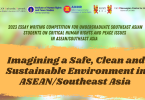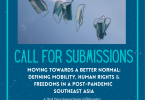SHAPE-SEA Commissioned Research Project for 2019
Exploring the Nexus between Technologies and Human Rights: Opportunities and Challenges in ASEAN/Southeast Asia
Throughout the world, technologies are increasingly changing ways in which individuals and societies interact, influence others, and enjoy rights and freedoms. We are said to be in the Fourth Industrial Revolution, which is characterized by a range of new technologies that are fusing the physical, digital and biological worlds, impacting all disciplines, economies and industries, and even challenging ideas about that it means to be human1.
Within ASEAN/Southeast Asia, technologies have shaped ways that we develop and disseminate information about our experiences and identities. Furthermore, technologies have helped defy political and social norms, and have broken structural, language and even, ideological barriers amongst individuals and groups. People who are silenced, marginalized, and powerless have indeed found an ally in virtual platforms and technologies. However, many governments deem this phenomenon to be threatening. This digital revolution has pushed many ASEAN governments to regulate online activities in the pursuit of protecting social harmony, national interests and peace2.
The proliferation of technology has brought about positive benefits to communities and societies. Technology has contributed to the improvement of the protection of rights, the storage and consumption of data, and the transparency of supply chain. Moreover, technology has now become a major tool to guarantee the quality of education for all people through online learning systems that help around 150 million children around the world3. In terms of the storage of data, there is vast amount of data on migration, tracking devices, sensors, and environmental condition made available to the public. Lastly, technology is also seen as a pathway to improving the human rights in labour supply chains, where it is estimated that 30 million people currently work in forced labour4, as it enables an authentication mechanism that provides transparency in supply chains of many corporations.
However, mass developments in online platforms, artificial intelligence, and automation raise serious questions about potential harms against human rights and freedoms. There is a risk that the use of technologies (both hardware and software) may result to further economic and social inequalities and injustice. The growth of the giant economy facilitated by technology has contributed to changes in natures of work by increasing the availability of flexible positions that provide opportunities for some while negatively affecting the livelihoods of others. Additionally, the mass collection of data could potentially lead to violations of the right to privacy and make it easier for governments to monitor the activities of activists arbitrarily. The use of technology to spread fake news and facilitate cyber bullying and violence, most of which are against women5 , has endangered one ™s personal security and freedom of expression.
Such realities, therefore, give rise to these critical questions:
- How can we defend and claim human rights in atechnological landscape?
- What is the role of technological development inprotecting human rights and freedoms?
There is still a lack of references on potential and existing impacts of technology in ASEAN/Southeast Asia. It is crucial for scholars in the region to clearly identify and comprehensively analyse harms and benefits of technologies towards the protection of human rights and fundamental freedoms.
SHAPE-SEA ™s Commissioned Research for 2019 seeks to examine potential and current impacts of technologies on various aspects/issues related to the promotion and protection of human rights in ASEAN/Southeast Asia. The main output will be an academic book consisting of 8-9 papers that explore the nexus between technologies and human rights in ASEAN/Southeast Asia.
SUBMISSION OF CONCEPT NOTES
Applications are for individual articles, not for the entire book. In short, SHAPE-SEA will be selecting 8-9 researchers who will each be producing an article for the book. Submissions (using the required application/ concept note form) should include a title, Research Rationale, research questions, methodology, hypothesis, and a list of bibliography of related work. Please submit the accomplished application/concept note form, together with a copy of an academic paper/ report relevant to the theme, to SHAPE-SEA Research Committee at research.shapesea@gmail.com by 28 February 2019.
Download Application/Concept Note Form here
Individual applicants should select a specific area where the intersection between technologies and human rights in Southeast Asia is unexplored or understudied, and provide further analysis on the chosen area. Topics may include (but not limited to):
- Cyberwarfare
- Cyber violence
- Dark Web and Trafficking
- Cyber and computer laws and their impacts onfreedom of expression
- Changing nature of conflictin the region due to the technology
- Changes to intellectual property, in particularaccess to health services, medicines or GMOs
- Medical technologies such as surrogacy, orgenetic manipulation
- Social media and elections
- Populism, authoritarianism, and the role of fakenews
- Open Data and Governance
- Accessible and Inclusive Technologies forPersons with Disabilities
- The Right to be Forgotten
Notifications of selection results will be sent on 29 March 2019 (Friday).
COMMISSIONED WRITERS
SHAPE-SEA is in search of experts with the ability to conduct a short-term study and produce an original and well-researched academic paper of 8,000-12,000 words on the identified theme.
Selected individual researchers are given six to seven months (April-October 2019) to conduct data collection and produce the academic article. Selected researchers will receive a full fee of US$ 3000, inclusive of expenses.





